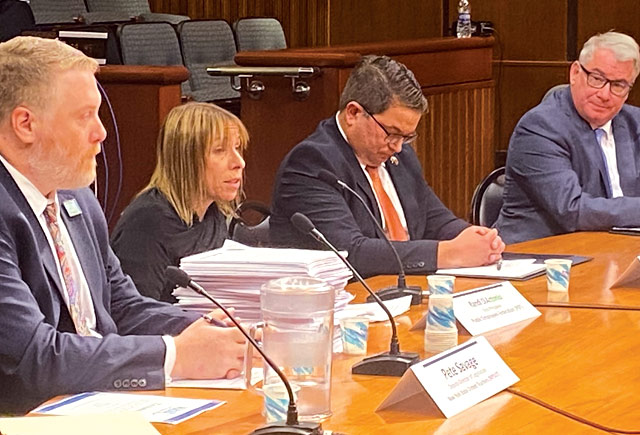
October 12, 2023 — Vice President Randi DiAntonio testified before the Senate’s Civil Service and Pension Committee on October 11, urging the state to reform pension plans; fix compensation and the lag payroll system; and combat bullying in the workplace to attract much-needed talent.
“Since 2021, the state has lost 16,858 employees due to attrition,” she told the committee, chaired by Sen. Robert Jackson, a former PEF member. “This is the highest level of attrition recorded in the decade that the report has been compiled by the Office of the State Comptroller.
“Staff are fleeing state employment,” DiAntonio said. “We hear it from our members: they can earn more in the private sector. Our members are frustrated they can’t do their jobs effectively or efficiently due to the lack of staff and they are tired of being overworked and undercompensated.”
Lack of staffing at New York agencies profoundly inhibits the state’s delivery of public services – from public safety, to support programs for the incarcerated, to appropriate care for the most at-risk residents, to the safety of roads and bridges, and so much more.
Using the insight of the employees who are actually delivering these public services, PEF proposes the following solutions to improve recruitment and retention of State workers.
Tier 6
“The state retirement plan was once called the ‘career plan,’” DiAntonio said. “That is because defined benefit plans are designed to reward longevity and service. The Tier 6 plan does not provide incentives to remain in state service.”
The Tier 6 improvements PEF supports include:
- Reduce the mandatory contribution for Tier 6 members to 3%
- Reinstitute the 2% FAS calculation at 20 years of service (currently it’s 1.5%)
- Reduce retirement eligibility from age 62 OR age 55 with 30 years of service
At the New York State Fair this summer, PEF collected more than 5,000 letters calling for New York to “Fix Tier 6!”
“A wise state Senator once famously said, ‘Tier 6 sucks,’” she said. “We agree wholeheartedly. It is probably the subject that members bring up most often when discussing their concerns with state service.
“PEF thanks you for successfully reducing the vesting period from 10 to 5 years and temporarily excluding overtime from the calculation of employee contributions,” PEF’s written testimony to the committee stated. “We implore you to continue correcting the pension problem.”

Compensation
The union continues to advocate for a comprehensive pay grade study to ensure the state increases compensation for all titles to be more competitive with the private sector.
“PEF members are professional, technical, and scientific staff,” DiAntonio said. “Most have advanced degrees and are sought after by private industry. PEF is very pleased that the Governor advanced and the Legislature approved a proposal to examine the civil service pay structure. This is long overdue and must be a top priority. PEF believes every state title requires an increase of at least two pay grades to keep pace with inflation and the private sector.”
The lag payroll system is also an impediment to recruitment.
Established decades ago, the system requires new State hires to wait two pay periods before they get their first paycheck, plus they are subject to an additional withholding equivalent to one day’s pay in each of the first five pay periods.
The fifth pay period after they are hired is the first instance new employees receive a full paycheck.
“There are very few potential new hires, especially those fresh out of college with loan debt, who can afford to wait five weeks before getting their first full paycheck,” the union’s testimony stated.
 Bullying
Bullying
PEF continues to field concerns from members, especially nurses and health care professionals, about the state’s toxic work culture and argues there needs to be further consideration and action.
“PEF has worked with the Legislature to introduce legislation to codify actions in the workplace that constitute ‘bullying’ and ‘abusive conduct,’” PEF’s testimony states. “This legislation would require all state employees receive training to identify inappropriate conduct with the hope of preventing it.”
The bill was passed by the Assembly last session and PEF will be lobbying for Senate approval when the new session begins in January.
To read PEF’s full testimony, click here.

